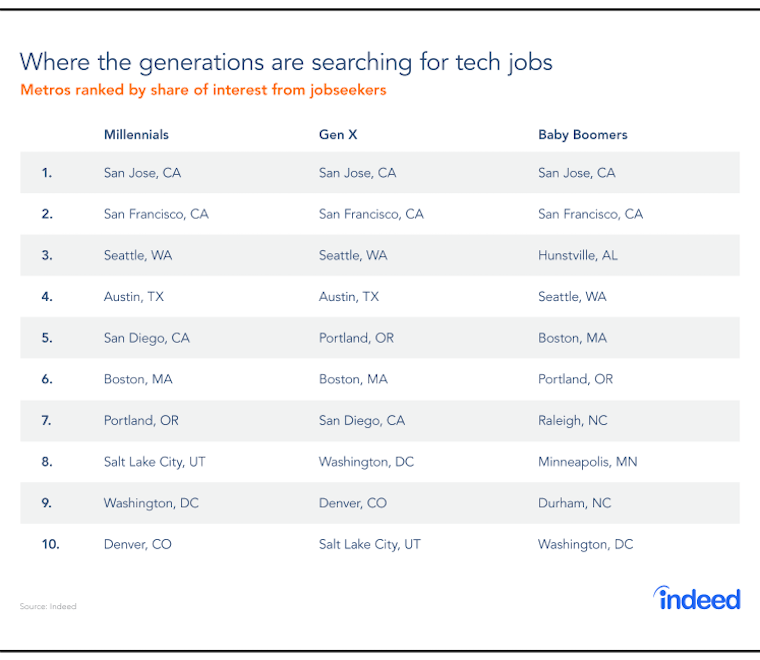As we’ve explored in the past, in Silicon Valley, age discrimination is so prevalent that it has become a cliché for jokes and movies. And now, new research by the job search service, Indeed.com, reveals that 43 percent of tech workers in the U.S. who are over the age of 40 fear they will lose their jobs due to their age. And 18 percent of workers say they worry about being laid off because of their age “all the time.”
43% | Percentage of tech workers who worry about losing their jobs due to their age
18% | Say they worry about it “all the time”
36% | Report experiencing at least one instance when they weren’t taken seriously by colleagues and managers due to ageism
However, there’s a disconnect between a fear of losing their job felt by many older tech workers and the high regard their fellow employees feel toward them. According to the survey, the older workers get, the more concerned they are about their careers. And yet most of their colleagues believe they still have much to contribute.
78% | Percentage of all tech workers who consider tech workers age 40+ to be highly qualified
83% | Percentage of all tech workers who say workers age 40+ have a good experience and can share wisdom
The survey reveals that those who work at tech companies believe their companies are trying to have more diversity in their workforce.
85% | Percentage of tech employees believe their company cares about attracting and retaining a diverse employee base
50% | Say their firm definitely cares
55% | Say that employee diversity has improved since they began working for their companies
87% | Percentage of tech workers who say diversity has a positive impact on performance
Despite reports that ageism is forcing many older workers to look outside Silicon Valley, Indeed’s research suggests that the Bay Area is the main draw for workers of all ages. San Jose and San Francisco hold the top two spots for each generation.

There are some surprises when you dig down into the obvious tech-job narrative. One finding that needs more research to verify could change the strategies of cities that want to be “the next Silicon Valley,” for example. As the population ages and the need for different types of tech skills emerge, such cities may want to be “the next Huntsville, Alabama.”
Quote from Indeed.com study:
“Huntsville, Alabama places third for Boomers but doesn’t register at all for the other age groups. Although this may seem surprising at first, the city has been a space flight hub since the 1950s and employers such as Boeing, Northrop Grumman have a strong presence there. While firms such as these may not spring to mind when you think of a “tech” company in the sense of a unicorn founded in a dorm room, they are unquestionably technology firms — albeit of an earlier generation. We also see Boomers showing more interest in cities such as Minneapolis (home to 3M) and Durham, NC, which don’t appear in the top 10s for Gen X or millennials.”
How can companies make meaningful change?
How can companies make it clear that ageism shouldn’t be tolerated, as prejudices of all types can’t be? Some ageism is baked into the tech and internet culture. It is one of the few “isms” that is still okay for shows like Saturday Night Live to reinforce.
One way is by incorporating age-inclusive language and practices into those existing initiatives, says Indeed’s Raj Mukherjee. “Human resources and recruiting professionals can examine the language they use in job postings. Removing terms like “recent graduate” and “digital native” could help encourage older professionals to apply for these positions.”
istock, Indeed.com
How Silicon Valley’s Ageism Can Result in a Deep Pool of Small Business Talent
